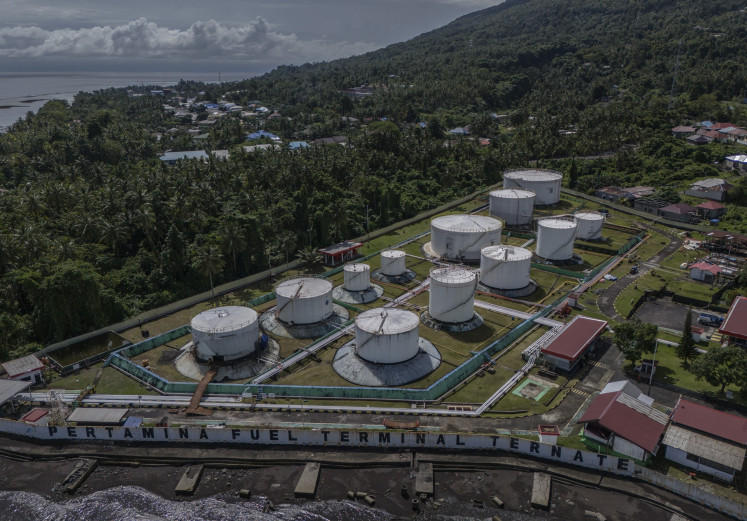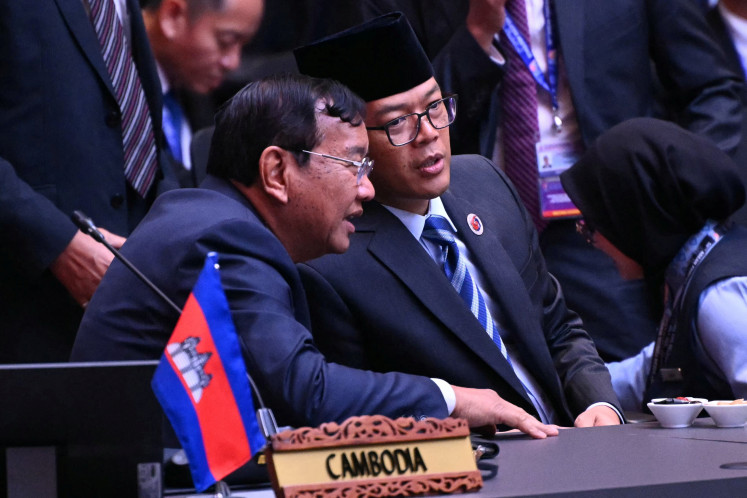Popular Reads
Top Results
Can't find what you're looking for?
View all search resultsPopular Reads
Top Results
Can't find what you're looking for?
View all search resultsBeing silenced in Ubud
The recent Ubud Writers and Readers Festival (UWRF) 2015 controversy raises the question: Whatever happened to our much-vaunted freedom of speech?Three discussion sessions related to communism and 1965 were canceled, including a panel on Bali in 1965, a screening of The Look of Silence by Joshua Oppenheimer, and a photo exhibition of The Act of Killing on 1960s survivors
Change text size
Gift Premium Articles
to Anyone
T
he recent Ubud Writers and Readers Festival (UWRF) 2015 controversy raises the question: Whatever happened to our much-vaunted freedom of speech?
Three discussion sessions related to communism and 1965 were canceled, including a panel on Bali in 1965, a screening of The Look of Silence by Joshua Oppenheimer, and a photo exhibition of The Act of Killing on 1960s survivors.
I was a participant in the Emerging Writers program. The cancelled discussions extended to other issues that could potentially 'disturb the public peace' ' or at least that was what local authorities seemed to think.
The discussion of Bali's reclamation plan was canceled, so was a book launch by fellow author Eliza Vitri Handayani.
Eliza, a novelist who for some time lived in Norway, has written a book about her youth in the early reform period in 1998, entitled From Now On Everything Will Be Different. She talked about neither communism nor 1965 in the book.
During the event Eliza walked around wearing a T-shirt depicting scenes from her novel, and handed out her name cards explaining the cancelation of her book launch.
A rather unique case occurred regarding the canceled launch of the novel The Crocodile Hole by Saskia Wieringa, a lecturer in Amsterdam and a researcher on gender studies. It was canceled evidently because the content included Gerwani (Gerakan Wanita Indonesia, or Indonesian Women's Movement) one of the largest Indonesian women's organizations in the 1950s and 1960s, and an affiliate of the Indonesian Communist Party.
Cleverly, the Yayasan Jurnal Perempuan (Women's Journal Foundation), the novel's publisher, moved the event to Nuri's Nacho Mama's restaurant, near a main venue of the festival.
Police and intelligence agents monitored the event, some in plain clothes and taking pictures of everyone. A friend who was there asked one of them what the pictures were for and his answer was simply 'documentation'.
However, the show passed off well because organizers told the local authorities that it was a mere luncheon where people were free to talk about anything.
Couldn't the festival committee have used similar tactics? At the opening press conference, Indonesia program manager I Wayan Juniartha said local authorities had not directly prohibited selected discussions, but only refered to certain rules and advised them to cancel them, otherwise the whole festival could have been in jeopardy.
I believe the committee did everything it could with the best interests at heart. However, I cannot help but wonder if there was any way to do more, to fight more, to keep more of the events. Panel names could be replaced. Some things may have had to be compromised, but to just cancel all discussions that might worry authorities was very unfortunate.
The panel discussion on Bali's planned reclamation, for example, was the least we could do for Bali's best interests.
Perhaps the panel could not provide practical solutions, but at least they could have conveyed the concerns of local intellectuals (participants in the 'writers and readers festival', right?) to the people of Bali, where the event was held. If this could not be done, maybe we should not bother talking about history and reconciliation, among themes mentioned by the organizers.
The reason used by local authorities to advise the committee to cancel some sessions was also questionable. One panel discussion about Papua did make it through this so-called censorship, featuring Papuan journalist and novelist Aprila Wayar. I was present there, and Aprila talked loudly and forcefully about injustices in Papua.
Aprila repeatedly declared that Papua does not benefit from its status as part of Indonesia. There was no intelligence agent present during the discussion.
Festivals like the UWRF should be an arena of free expression, of exchanging ideas and experiences. Not only about literature, but also social and political contexts, because literature should not and need not be separated from them. It is precisely by involving as many elements of the community as possible that the festival gets its meaning.
The issue of communism and the year of 1965 has always been full of controversy. Screenings of Oppenheimer's movie are almost always banned, yet many campuses and communities across Indonesia have managed to screen it anyway, and they clearly have neither greater resources nor funds than the UWRF.
This year's festival made me realize that the issue is not merely censorship of discussion of communism and 1965. It is not about a case of cracking open an old wound or a reconstruction of history.
It is far bigger than that: we are being silenced. We are being denied our rights as citizens to discuss what is important to us. When voting for President Joko 'Jokowi ' Widodo, I never imagined people in certain regions in this country would not be able to discuss their own problems in a festival held in their own land.
Even more troubling is to guess in which direction we are heading as a nation.
______________________________________
The writer lectures at the School of Communication, Atma Jaya Catholic University, Jakarta.
Her short story, 'One season, and the next', is published in 17,000 Islands of Imagination: A Bilingual Anthology of Indonesian Writing, launched at this year's Ubud Writers and Readers Festival.
The views expressed are her own.










